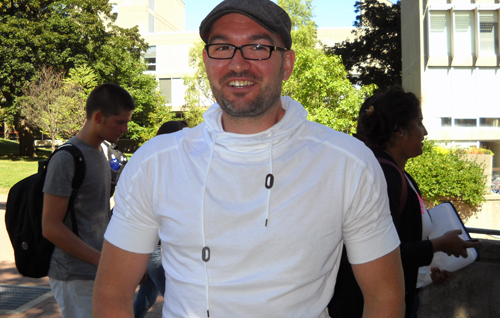
A first-ever short film by a U of G grad student has won top prize at a Toronto film festival last month.
Nick Loess, a PhD student in the School of English and Theatre Studies (SETS), bested more than 70 filmmakers worldwide whose work had vied for the annual event’s top prize.
His experimental short film was screened last month in the Toronto Urban Film Festival (TUFF), billed as North America’s largest commuter film festival.
The Guelph student’s one-minute film, called 24Progressive, appeared on subway platform screens in about 60 Toronto Transit Commission stations in early September.
Now in its sixth year, the festival took place Sept. 7 to 17. Loess’s entry appeared in a daylong rotation with eight other submissions in the “Life Cycle” category.
He received the award – $2,000 plus filmmaking software – during a reception Sept. 16 at Toronto’s Drake Hotel.
He says he hadn’t expected to claim overall top honours. “I had an inkling there might be an award that I was up for – maybe in the experimental category or something else.”
This year’s guest judge, documentary filmmaker Jennifer Baichwal, announced the winner. “She told me my work is exceptional and to keep doing it because I’m onto something here.”
For his entry, Loess focused his digital camera on the subway itself. The result – footage of moving subway cars intercut with a video of 35mm celluloid film threaded through a projector – overlaps “the moving image with the moving city,” says Loess. View his film below.
The annual festival is run by Toronto’s Art for Commuters and Pattison One Stop. Entrants create a minute-long silent film, video or animation. More than 400 entries came this year from almost 20 countries; 75 were screened in the TTC system and were up for awards.
Sharon Switzer, executive director and co-founder of TUFF, says Loess’s entry “was an incredibly beautiful meshing of location and context. It was this perfect little one-minute jewel.”
Loess had visited Toronto earlier last month to view his work at several subway stops. “I was giddy, I couldn’t stop smiling. I’m standing there and seeing my work projected while people get on and off the train.”
“I’ve never really thought of myself as a filmmaker,” says Loess, “Now people are calling me an award-winning filmmaker. It’s reaffirmed something I had felt but there was still some uncertainty about accepting that title or what it might mean. I can do this for the rest of my life.”
The TUFF coincides with the Toronto International Film Festival. On its website, the urban festival bills itself as “like TIFF without the theatres, stars and parties.”
Loess didn’t attend the latter. He quips: “I can’t afford it.”
Had he gone to that “other” film fest, he says, he might have chosen to catch Looper or Midnight’s Children.
A big sci-fi fan, Loess includes among his favourites La Jetée, filmed in 1962 by Chris Marker. He also likes romantic comedies, especially Notting Hill with Hugh Grant.
He studies experimental film and improvisation with SETS professors Elaine Chang and Ajay Heble.
Loess is a videographer and researcher with U of G’s Improvisation, Community and Social Practice (ICASP) project, directed by Heble. In 2009, Loess produced a film for ICASP based on that year’s Guelph Jazz Festival and Colloquium.
Chang says 24Progressive shows her student’s scholarly and artistic interest film and its relation to video – both aspects of his doctoral research.
To view the film, visit http://www.torontourbanfilmfestival.com/films/24progressive#film-info-and-credits-wrapper